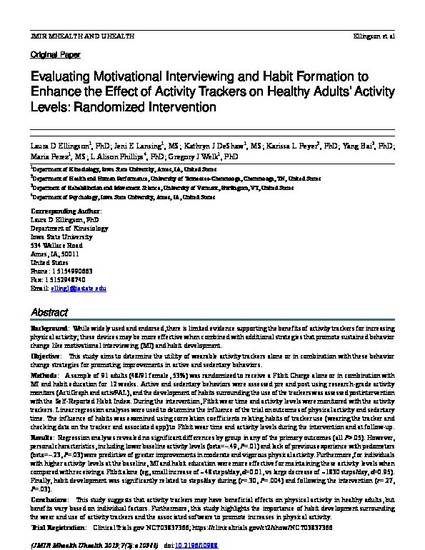
Background: While widely used and endorsed, there is limited evidence supporting the benefits of activity trackers for increasing physical activity; these devices may be more effective when combined with additional strategies that promote sustained behavior change like motivational interviewing (MI) and habit development. Objective: This study aims to determine the utility of wearable activity trackers alone or in combination with these behavior change strategies for promoting improvements in active and sedentary behaviors. Methods: A sample of 91 adults (48/91 female, 53%) was randomized to receive a Fitbit Charge alone or in combination with MI and habit education for 12 weeks. Active and sedentary behaviors were assessed pre and post using research-grade activity monitors (ActiGraph and activPAL), and the development of habits surrounding the use of the trackers was assessed postintervention with the Self-Reported Habit Index. During the intervention, Fitbit wear time and activity levels were monitored with the activity trackers. Linear regression analyses were used to determine the influence of the trial on outcomes of physical activity and sedentary time. The influence of habits was examined using correlation coefficients relating habits of tracker use (wearing the tracker and checking data on the tracker and associated app) to Fitbit wear time and activity levels during the intervention and at follow-up. Results: Regression analyses revealed no significant differences by group in any of the primary outcomes (all P>.05). However, personal characteristics, including lower baseline activity levels (beta=–.49, P=.01) and lack of previous experience with pedometers (beta=–.23, P=.03) were predictive of greater improvements in moderate and vigorous physical activity. Furthermore, for individuals with higher activity levels at the baseline, MI and habit education were more effective for maintaining these activity levels when compared with receiving a Fitbit alone (eg, small increase of ~48 steps/day, d=0.01, vs large decrease of ~1830 steps/day, d=0.95). Finally, habit development was significantly related to steps/day during (r=.30, P=.004) and following the intervention (r=.27, P=.03). Conclusions: This study suggests that activity trackers may have beneficial effects on physical activity in healthy adults, but benefits vary based on individual factors. Furthermore, this study highlights the importance of habit development surrounding the wear and use of activity trackers and the associated software to promote increases in physical activity.
Available at: http://works.bepress.com/lalison-phillips/13/

This article is published as Ellingson LD, Lansing JE, DeShaw KJ, Peyer KL, Bai Y, Perez M, Phillips LA, Welk GJ; Evaluating Motivational Interviewing and Habit Formation to Enhance the Effect of Activity Trackers on Healthy Adults’ Activity Levels: Randomized Intervention. JMIR Mhealth Uhealth 2019;7(2):e10988; DOI: 10.2196/mhealth.10988. Posted with permission.